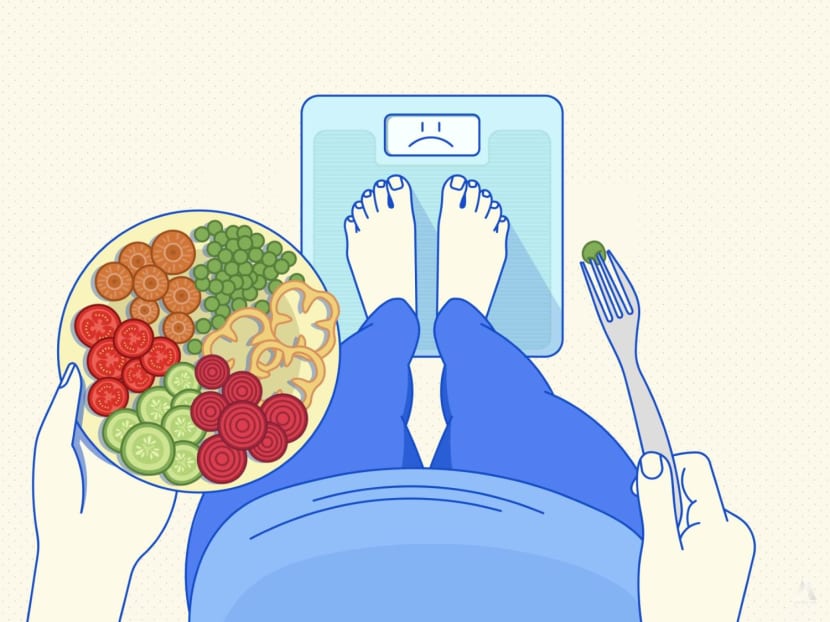Gen Zen: I felt guilty about eating as I counted calories to get fit. Here's how I broke free from that trap

(Illustration: CNA/Nurjannah Suhaimi)
SINGAPORE — Growing up, I dreamt of having well-defined abdominal muscles, or abs, seeing them as the epitome of attractiveness.
As a busy young adult, achieving this seemed impossible, but the Covid-19 pandemic offered a chance to focus on my goal through workouts at home, inspired by fitness influencers like Pamela Reif and Emi Wong.
However, achieving washboard abs required more than just core exercises.
It meant shedding tummy fat through a calorie deficit. So I began cutting down on carbohydrates, replacing dinners with protein shakes and hard-boiled eggs, and avoiding white rice in favour of high-protein meals such as steamed chicken or salmon.
When dining-in activities resumed, I found myself obsessively googling calorie counts before each meal, avoiding hawker favourites such as chicken rice due to its high calorie content.
The stress of dining at hawker centres with their carb-laden offerings became overwhelming.
The tipping point came when I succumbed to temptation by ordering a heaping plate of sweet and sour pork rice from my favourite zichar (stir-fried food) stall.
I thought I had successfully convinced myself that I could definitely burn all these calories when exercising. But as I stuffed my mouth with every spoonful of rice, I was wracked with guilt instead. I wanted to throw up.
Thankfully, I managed to stop myself from rushing to the toilet bowl. Somehow, I was also acutely aware that I needed help instead of letting these thoughts fester.
So I spoke with a therapist, who helped me realise that I was tying my self-worth to physical appearance. At the same time, Covid restrictions were loosening and I figured that a good way to exercise more efficiently — and hopefully ease my food-related guilt — was by signing up for high-intensity interval training (HIIT) classes as gyms reopened.
Levelling up my workouts with classes where instructors push you to succeed often left me drained, but I felt stronger and more confident. I stopped counting calories because I knew I was burning a lot of fats in one-hour classes.
Three years have passed since then and while I have steered clear of the abyss, I am occasionally troubled by the thoughts of "what if".
What if I were to find myself close to the edge again? What if I see food as nothing but pesky piles of calories one day, taking away my ability to enjoy it? What if my stomach gets pudgier with age? Can I overcome the self-hate?
WHAT IS CALORIE COUNTING AND WHY DO PEOPLE DO IT?
Calorie counting is a method for managing diet and weight by tracking the number of calories consumed through food and beverages.
Other than losing weight, some people may choose to do it to maintain their current weight, gain muscle and manage certain conditions such as diabetes or heart disease.
For me, it was to shed extra belly fat so that my abs would look more defined once I started training. Counting calories was as simple as seraching for “chicken rice calories” on Google before deciding whether to eat it.
However, as Ms Eunice Seah warned me, this process can be insidious.
The clinical psychologist at InPsyche Journeys Psychological Growth & Discovery said that calorie counting can range widely in its intention and impact, from unhealthy to healthy extremes, and both ends of the spectrum can lead to negative consequences.
"For instance, a person who meticulously counts every calorie and plans meals strictly around these calculations might miss out on essential nutrients or forgo social interactions if their peers have different views on calorie counting," she said.
On the other hand, she said that another person may cut calories to maintain a certain weight or physical appearance.
"Both individuals share a common extreme focus on calorie cutting, often at the expense of important daily essentials, ranging from basic nutrition to social interactions."
As a result, some people might fall into the trap of seeing food purely as calorie units, which can affect their enjoyment of food at meal times.
Ms Lysia Tan, a clinical psychologist from Mind What Matters, said that in more serious cases, a person may feel guilty whenever they eat, leading to an unhealthy and excessive obsession with limiting caloric intake, such as through starvation or purging after eating.
This sounded very much like me three years ago, when I was just one step away from wanting to make myself throw up.
COMMON SIGNS THAT SOMEONE NEEDS PROFESSIONAL HELP
At what point do we need intervention? Should we wait until the purging stage to seek help?
Ms Tan and Ms Seah said that some common signs to look out for are when the obsession starts to affect the person's regular lifestyle, such as:
- Finding excuses to skip meals and declining invitations or staying out past mealtimes instead of joining in family meals
- The inability to enjoy meals as before, to the extent of affecting work and social relationships
- Withdrawing from certain previously enjoyable activities
However, Ms Tan explained that calorie counting, which often disregards natural hunger cues, requires significant self-restraint to avoid “bursting one’s caloric budget”.
“Over time, this restraint can falter, or the body may adapt its hunger signals to seek other ways to fulfil cravings, leading to more frequent snacking or binge-eating episodes,” she said.
“This creates an unhealthy eating pattern, making each mealtime stressful as individuals struggle with guilt and satisfaction.”
I understood that struggle. I'm relieved that I never reached the point of binge eating or skipping meals back then. I made sure to eat three meals a day, but I was very careful about my food choices, focusing on losing stomach fat rather than overall weight.
BALANCING FITNESS GOALS WITH FOOD
While expectations vary from person to person, I was curious about how to shift one’s perspective from viewing food solely as a source of calories to appreciating it for its nourishment and enjoyment.
Ms Seah emphasised the importance of understanding the underlying mindset behind calorie counting before effective interventions can be applied.
“Calorie counting is often thought to be purely a physical issue related to food, but it’s frequently driven by psychological and mental health conditions such as anorexia, or psycho-social factors like self-esteem issues.”
If you notice someone at risk, Ms Seah recommends talking to them to understand their reasons for counting calories, including their views on a healthy lifestyle and their relationship with food.
“Please don't take it upon yourself to cure this person or solve it. Redirect to seek medical help if needed.”
Ms Tan highlighted the importance of making realistic lifestyle changes for sustainable health and fitness, noting that extreme measures such as weighing food for precise calorie counts can be impractical for most people.
She recommended adopting healthier habits such as selecting lunch spots that offer nutritious meals, varying daily food choices, and cutting down the time spent sitting by standing during Zoom video calls, for instance.








